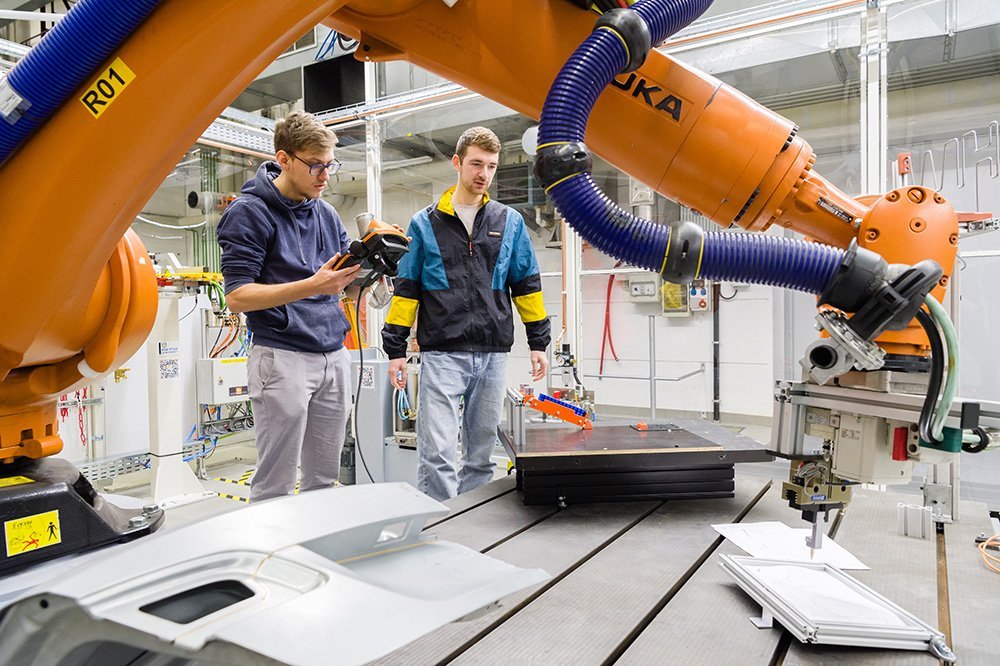
Robot competence centre at the HTWD: New paths in student education
The Faculty of Mechanical Engineering has opened a robot competence centre that will be available to students and researchers from various departments in the future.
Students from various disciplines can now work with new robotics and automation systems on the premises of the former automotive engineering engine test bench. Two large industrial robots from KUKA with payloads of 240 kg and 210 kg are available to provide students with practical experience in operating and programming these machines. "Training concepts for robotics education have only been developed in recent years. HTW Dresden is the first university in Saxony to offer a corresponding course of study," reports Professor Uwe Kühsel, Head of the Robot Competence Centre.

Robotics training with state-of-the-art infrastructure and a practical focus
The centre is not only equipped with state-of-the-art robots and tools, but also offers a comprehensive training infrastructure, including a fully automated robot cell and mobile training units. This equipment enables students to develop complex skills in robot programming and application while working on real industrial projects.
"Robotics will play a crucial role in industry in the future and we want to ensure that our students are prepared for these challenges. By providing practical training, we open up new opportunities for our students and at the same time strengthen their competitiveness on the labour market," says Prof. Kühsel. The new technology centre is not only open to students of the Faculty of Mechanical Engineering, but also to other disciplines that can benefit from the new training opportunities. Through cooperation with industrial partners and the integration of current research topics, the centre will become a hub for innovation and knowledge exchange in the field of robotics.
Robotics will play a crucial role in industry in the future and we want to ensure that our students are prepared for these challenges.
Robotics training with state-of-the-art infrastructure and a practical focus
The centre is not only equipped with state-of-the-art robots and tools, but also offers a comprehensive training infrastructure, including a fully automated robot cell and mobile training units. This equipment enables students to develop complex skills in robot programming and application while working on real industrial projects.
"Robotics will play a crucial role in industry in the future and we want to ensure that our students are prepared for these challenges. By providing practical training, we open up new opportunities for our students and at the same time strengthen their competitiveness on the labour market," says Prof. Kühsel. The new technology centre is not only open to students of the Faculty of Mechanical Engineering, but also to other disciplines that can benefit from the new training opportunities. Through cooperation with industrial partners and the integration of current research topics, the centre will become a hub for innovation and knowledge exchange in the field of robotics.
First robotics master's programme in Saxony
The new "Applied Robotics" degree programme has been on offer since last winter semester. It offers students the opportunity to familiarise themselves intensively with the latest developments in the field of robotics and to acquire practical skills in the application of robot technology. They receive in-depth training in the fields of robotics, automation technology, programming and machine learning. Graduates are ideally equipped to work successfully in various sectors such as the automotive industry, aerospace, logistics, medicine and many others. The demand for professionals with expertise in robotics is constantly growing, and this degree programme offers an excellent opportunity to specialise in a promising field.
Professor Kühsel understands the term "grasp" literally and emphasises practical training. "Robotics will be important for a functioning economy and industry in Germany, especially in view of the shortage of skilled labour and demographic trends. In addition, robotics is opening up more and more areas of application, be it in agriculture, service, medicine or the leisure sector through to culture and art."
Practical training, moving and programming a robot creates a new understanding of technology. This knowledge can be utilised in the planning and construction of robotic systems.
Contact
M.A. Mira Höfler
- Z 124
- +49 351 462 3519



![[Translate to English:] m](/fileadmin/HTW/Hochschule/1_Aktuelles/24_Bilder_News/20240314_Robotikzentrum2.jpg)
![[Translate to English:] Zukünftig erlernen die Studierenden aus unterschiedlichen Studiengängen in interdisziplinärer Zusammenarbeit das Programmieren der helfenden Maschinen.](/fileadmin/HTW/Hochschule/1_Aktuelles/24_Bilder_News/20240314_Robotikzentrum3.jpg)

